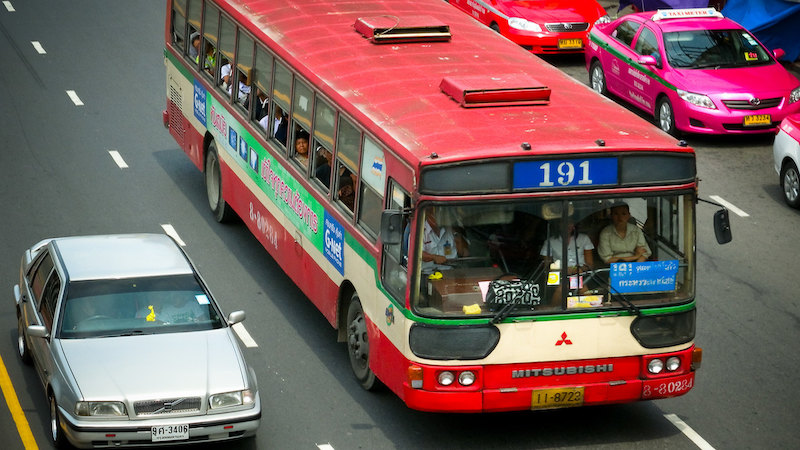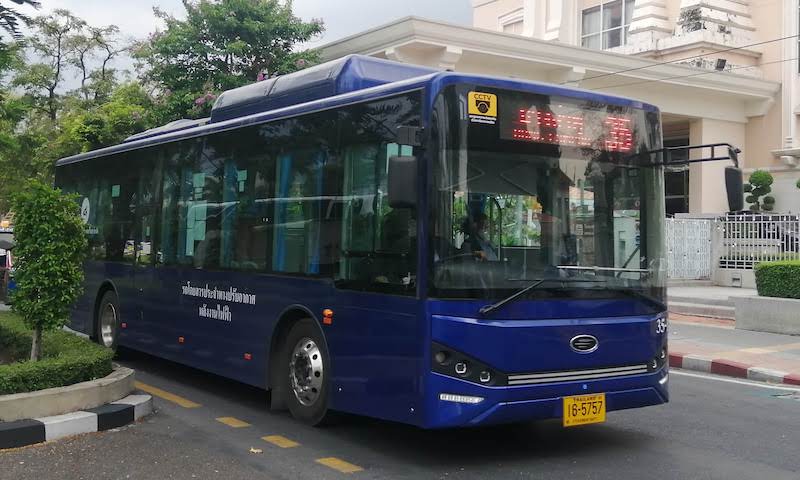As Switzerland buys the first ever bilateral offsets, civil society’s analysis suggests the claimed emissions reductions from Thai buses would have happened anyway
The first-ever exchange of carbon credits between countries under a new Paris Agreement mechanism is facing criticism over whether the offsets deliver the emission reductions claimed.
Switzerland has bought from Thailand the first batch of carbon offsets under the mechanism, created through the rollout of electric buses in the Thai capital Bangkok as part of a bilateral partnership.
It is the first-ever completed transaction under article 6.2 of the Paris Agreement and the parties involved hailed it as a “beacon moment for climate action” and “a very important milestone”.
But an umbrella group for Swiss charities said the switch to electric buses “would have most certainly happened” without the offsets, raising questions over their integrity.
The Swiss government plans to use the credits towards achieving its emissions reduction goals under the Paris Agreement. If the quality concerns are correct, that means Switzerland would be given a licence to pollute without funding real climate action.
The controversy raises questions over the regulation of the offsets traded under the system. Currently, there is no centralised oversight of the credits and an EU attempt to introduce tighter controls at Cop28 failed.
Swiss-Thai cooperation
Switzerland is one of the most active proponents of bilateral credit trading under article 6. The December transaction is part of a wider agreement signed between Switzerland and Thailand in early 2023.
While the credits will ultimately be used in government plans, private operators are tasked with carrying out the project.
The project is coordinated by South Pole, a Swiss company that is one of the world’s leading sellers of carbon credits and has been mired in controversy over the last year.
South African ministry uses opaque modelling to argue for weakening climate ambition
Energy Absolute, a Thai renewable energy company, is generating credits by converting thousands of petrol-fueled private buses in Bangkok to electric vehicles. Switzerland’s Klik Foundation, which represents fossil fuel importers in the country, is funding the programme through the purchase of credits.
Swiss law requires fuel importers to compensate for part of their carbon dioxide emissions. The Klik Foundation buys credits on the companies’ behalf and finally transfers them to the federal government, which will count them towards its emission reduction targets.
The Thai electric bus scheme is among dozens the Swiss group is looking to implement across the world.
Additionality doubts
The Thai project developers claim that, without the funding guaranteed by the sale of offsets, the switch to electric buses would have not been economically viable.
So the offsets will cut emissions beyond what would have happened anyway, they argue. This is known as ‘additionality’.
Alliance Sud disputes this, casting doubts over the integrity of the credits. In a research dossier, it claimed “additionality is at best non-transparent, and at worst, non-existent”.
Alliance Sud said the economic justification for the project failed to take into account the long-term benefits of direct investment from the Energy Absolute group, which specialises in renewable energy and electric vehicle manufacturing.
An e-bus operated by Thai Smile Bus, the beneficiary of the offsetting scheme. Photo: Patiparn.Nice2002bkk
It found that the same transport operator targeted by the project had already been running electric buses in Bangkok well before the start of the offsetting scheme – as early as 2021, over a year before the start of the project.
In a statement, the Klik Foundation did not address the buses seen in 2021 but says “the first 120 buses” seen in 2022 were just a pilot programme.
“This project shows it is basically impossible to have a guarantee that these certificates can be a real substitute of domestic emission reductions which Switzerland should instead focus on,” Delia Berner, an international climate policy analyst at Alliance Sud, told Climate Home. “Switzerland is leading in a negative way”.
‘Pure speculation’
Mischa Classen, an independent carbon market consultant and former director of the Klik Foundation, disagrees with Alliance Sud’s analysis.
“From my knowledge, Thailand has no policy intervention that would support private bus operators to switch to electric, which is the main additionality argument in this project. There’s no economic reason for a priva
Read More


